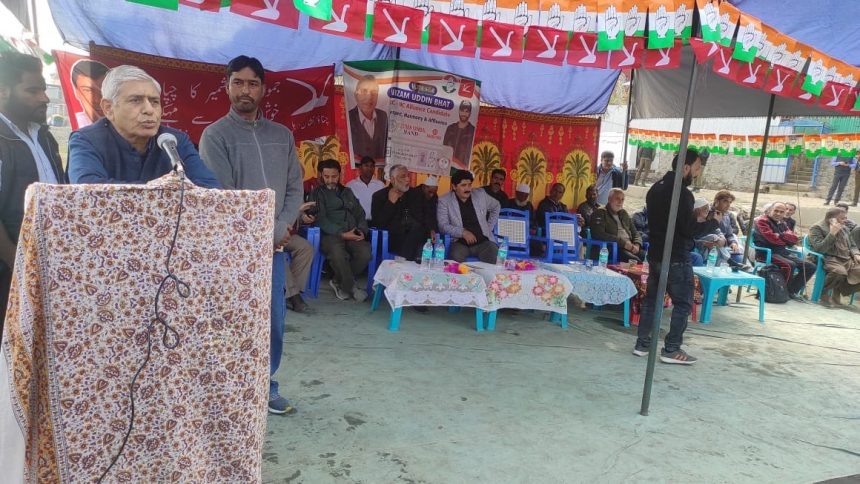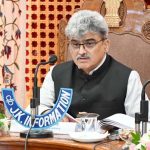Bandipora, Nov 10: Four Members of the Legislative Assembly (MLAs), along with local stakeholders and the fishermen community, came together to raise awareness about the declining state of the famous Wular Lake. They came on the invitation of the Wular Fishermen Union, which is dedicated to the lake’s preservation and conservation.
The delegation included senior Congress leader and MLA Bandipora Nizamuddin Bhat, National Conference MLAs Hilal Akbar Lone (Sonawari) and Irshad Rasool Kar (Sopore), and MLA Kreeri Irfan Hafeez Lone.
The visit, held on the banks of Wular Lake in Zurimanz village, was marked by the active participation of union members and fishermen from surrounding villages. To witness the lake’s deteriorating condition firsthand, MLA Bhat and MLA Lone (Sonawari) took a symbolic boat ride from Laharwalpora to Zurimanz. The visit aimed to highlight the alarming decline in the lake’s ecology and the severe impact it has had on local livelihoods, particularly for the fishing community.
Wular Lake, once spanning around 217 square kilometres, was once one of Asia’s largest freshwater lakes. However, due to encroachment, siltation, deforestation, and pollution, it has shrunk significantly over the years. Untreated sewage, agricultural runoff, and unchecked weed growth have further degraded the lake, severely threatening its water quality, biodiversity, and the local economy, which relies heavily on fishing and tourism.
While the Wular Conservation Project, led by the Wular Conservation and Management Authority (WUCMA), has been working to desilt and restore parts of the lake, progress has been slow. Conservationists have repeatedly called for greater involvement from all relevant stakeholders, including local communities, government agencies, and environmental experts, to ensure the lake’s restoration.
However, despite the infrastructure and funding allocated to WUCMA and its associated departments, such as the Forest, Irrigation and Flood Control, and Soil Conservation departments, critics argue that the authority has been ineffective in addressing the scale of the crisis.
During the visit, the MLAs underscored the urgency of conserving Wular Lake, saying that efforts must be coordinated among all stakeholders, particularly WUCMA. “The responsibility for conservation should not rest solely with WUCMA but requires a multi-stakeholder approach that includes local communities, government agencies, NGOs, and environmental experts,” they said.
The MLAs also expressed strong disappointment over the absence of district administration representatives, despite an invitation to attend the event. “Their absence is a matter of concern, especially considering the high public interest in this issue and the importance of the community’s involvement. It raises serious questions,” they said.
There was also strong public protest regarding the absence of the district authorities. Many community members voiced frustration, pointing out that the presence of district officials was essential for the coordination of any effective action plan. Locals insisted that without active engagement from district authorities and relevant agencies, meaningful efforts to restore Wular Lake and protect the livelihoods of the people who depend on it would not be possible.
“The district administration’s absence is unacceptable. We rely on these departments as our guardians, and their lack of participation in this crucial discussion is disappointing,” said one local fisherman.










